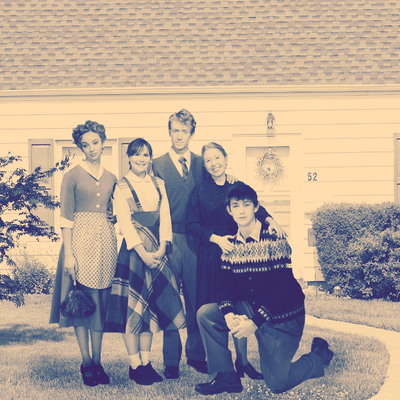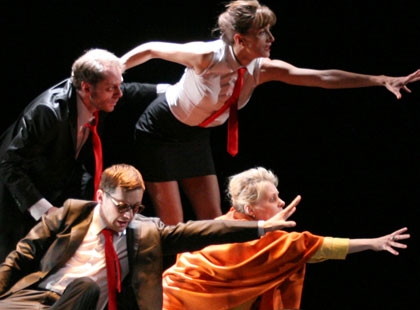
Hello all! I hope you had a wonderful weekend full of shows and company (pun intended)(this makes me wonder how I have friends). I went to a lot of shows during mine and I want to tell you about one I saw on Friday evening with a friend. By the Skin of Our Teeth, written by Thorton Wilder, won a Pulitzer Prize for Drama, but its greatness in the literary world means more than just dramatic genius. The play is confusing and strange while also being fantastic and eye opening. It is hard to describe, and hard not to… It’s just one big mess in my head, basically. But I loved it so much and all of the thoughts that it provokes.
By the Skin of Our Teeth takes a look at basic human natures and those characteristics that make us human. By dividing human identities amongst a family of four and a family friend, the author shows how humanity grows and changes throughout history, how we have the capacity to destroy and to rebuild. It displays the human condition through metaphors and mixed timelines, displaying both the complete loss of faith and the ability to regain it and find hope again. All of this you don’t really understand till the end though. I guess I should start from the beginning.

The show began in the stone age, or was it the 50’s? You can’t really tell. While Mr. Antrobus, head of the family is off at work, Mrs. Antrobus is home with the maid, making house and trying to raise two kids. But while this may seem like a regular American family at first, it follows that the husband is off discovering the wheel and the alphabet, a dinosaur is freezing outside as an ice age approaches, the maid is milking a mammoth, and the son is Cane, renamed after infamously murdering his brother. Historical figures, like Moses, Homer, and the nine Muses, find shelter in the Antrobus’ home while they all huddle together and try to survive the approaching wall of ice. The play focuses on the unconditional love, compassion, and duty displayed by a mother, the unrivaled anger, innovation, and passion of a father, the suffering and joy of children, and in the maid we see a woman’s ability to inspire and dream while also maintaining a sense of reason. Sabina, the maid, breaks the fourth wall the entire play, coming out of character to explain to the audience how strange a scene is, or how she is as lost as us. It’s hilariously relieving as an audience member and very clever of the author, as he tells us that the production is supposed to be this puzzling.
The second act places itself in Atlantic City on the boardwalk as Mr. Antrobus becomes president of the Ancient and Honorable Order of Mammals, Subdivision Humans. Though we find ourselves on a boardwalk full of performers, dancers, sailors, business men, etc, it is also obvious that the great flood is approaching. Other orders of animals are sending representatives in pairs, a modern day fortune teller is predicting the great deluge as a prophet would. Mr. Antrobus reflects Noah as he summons these animals and his family onto a boat to once again start anew, but he also represents a more modern issue of adultery as he once again cheats on his wife with Sabina. President with a beauty queen, breadwinner with the maid, these are both archetypes of adultery that warrant discussion in the play. Henry, formerly Cane, feels the angst of adolescent and attempts to run away while his sister experiments with new fashions disliked by her mother an unnoticed by her otherwise distracted father. The play questions modern family dynamics as much as it does humanities abilities to cope during disasters and traumas.
The last act of the play opens on the shell of the Antrobus home, darkened and destroyed by war. Sabina seeks them out with a flashlight, declaring the end of a war. This act describes war, pushing a WWII theme onto the stage with set, wardrobe, and writing. It illustrates the effect tragedy, chaos, and destruction that humanity has the capability to inflict upon one another. The act also shows us how even a family that has lasted for thousands of years, through flood, fire, and ice, can still give up and lose hope. Mr. Antrobus and Sabina both feel the weight of what the world has done, and it takes so much for them to believe again. Henry becomes the enemy once again, led by his false belief of the neglect of his family. We see them struggle and fight and then make up when his mother shows him the truth of a family’s love. Sabina, inspired, reignites that spark of invention and human preservation that has always kept Mr. Antrobus going. We feel revived with the sensation of renewal. The Antrobuses move forward to try again where humanity has failed so many times. And Mr. Antrobus recalls the figures in human history that have inspired the philosophies of man, including Socrates and the Bible, as hours in the night. They pass slowly throughout history, but for human kind, what is history but one night in all of destiny?
It is a difficult play to describe. Its poetic nature donates so much to discussion that I want to stop here and just say how absolutely wonderful the cast was. They took something very difficult and played it perfectly, managing to mix its comedies with its dramas so fluidly that the audience was surprised to be laughing one moment and then shocked the next. It was a beautiful performance I and find myself better to have [seen] it.
Thank you for reading,
As always,
This is Danny fob. Artist and art reviewer.





